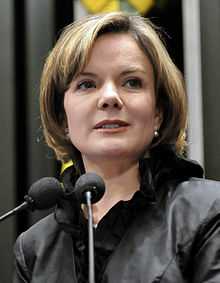Gleisi Hoffmann
| Gleisi Hoffmann | |
|---|---|
 | |
| 43rd Chief of Staff of Brazil | |
| Incumbent | |
| Assumed office 8 June 2011 | |
| President | Dilma Rousseff |
| Preceded by | Antonio Palocci |
| Personal details | |
| Born | 6 September 1965 Curitiba, Brazil |
| Political party | Workers' Party |
Gleisi Helena Hoffmann (Portuguese pronunciation: [ˈɡlejzɪ e̞ˈlẽnɐ] or [ˈɡlejzj ɛˈlẽnɐ ˈɦɔfmɐ̃], born September 6, 1965 in Curitiba, Brazil) is a lawyer and Brazilian politician.[1] Since June 8, 2011, she is Chief of Staff of Brazil.
Biography
Born into a religious family of German origin, she began her involvement in politics in the student movement during her youth, becoming a Partido dos Trabalhadores' member in 1989.
Known for her public management skills, Hoffmann has served as state secretary in Mato Grosso do Sul and as municipal secretary in the city of Londrina.
She was a member of Luiz Inácio Lula da Silva's presidential transition team in 2002, and served as the financial director at the hydroelectric dam Itaipu Binacional from 2003 to 2006.
She ran for the Federal Senate of Brazil in 2006 and for the office of mayor of Curitiba in 2008, losing both elections. At the time, she was the president of PT in the state of Paraná.
In October 2010, Hoffmann was elected to the Senate, receiving over 3.1 million votes, the most voted senator from the state of Paraná and the first woman to hold the office. After four months in office, she was appointed Chief of Staff,[2] the highest-ranking member of Brazil's Executive Office, by President Dilma Rousseff.[3]
Gleisi is the wife of Communications Minister Paulo Bernardo. They have two children.
References
- ↑ "Conheça a trajetória política de Gleisi Hoffmann (political trajectory Gleisi Hoffmann)". June 7, 2011. Retrieved 3 July 2011.(Portuguese)
- ↑ Colitt, Raymond; Stuart Grudgings (June 8, 2011). "Brazil's Rousseff tries to move on after aide quits". Reuters. Retrieved 10 June 2011.
- ↑ "Gleisi diz que Dilma manifesta 'apreço' ao Congresso ao escolhê-la". June 8, 2011. Retrieved 3 July 2011.(Portuguese)